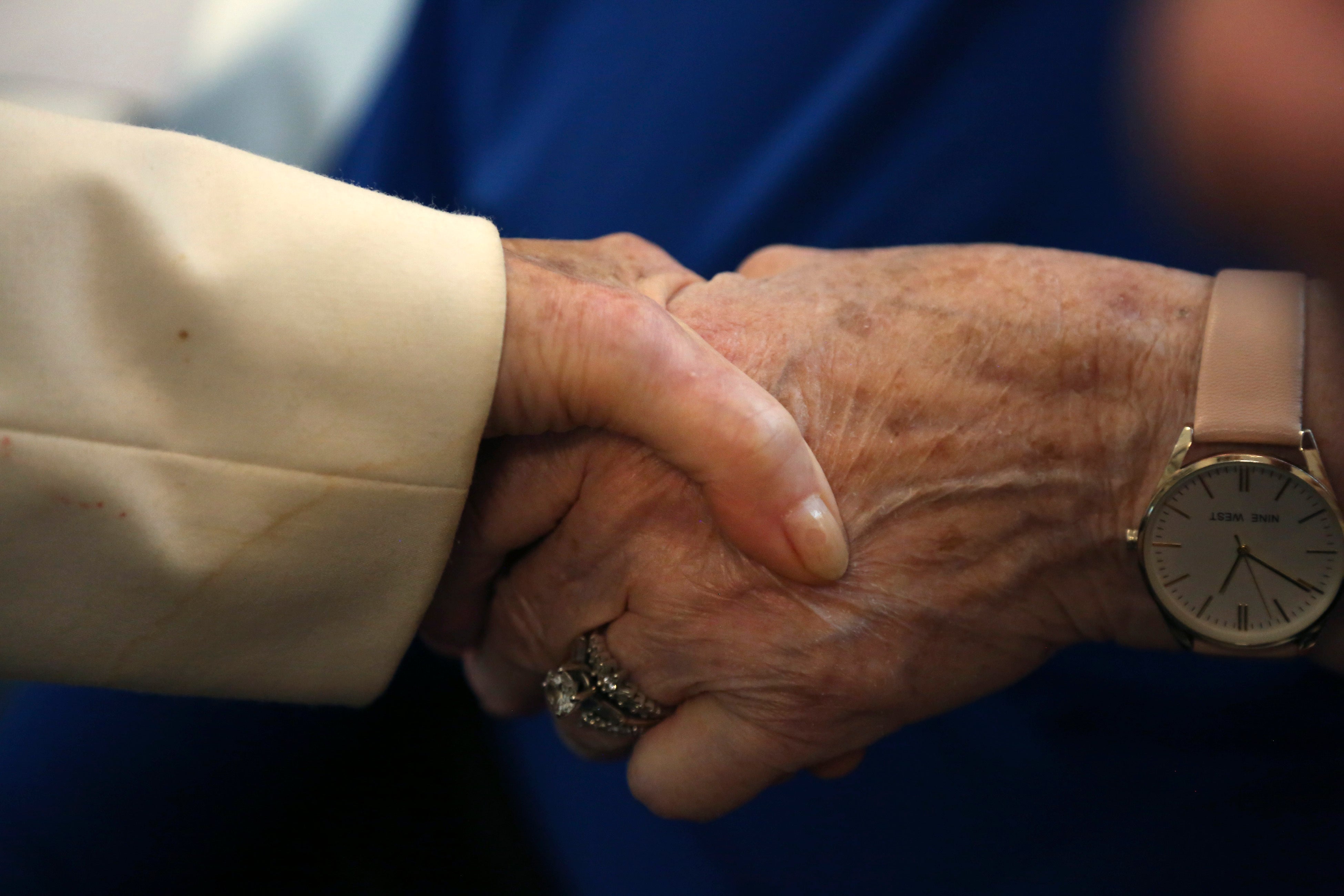NY Holocaust survivors celebrated at concert after isolation
Dozens of Holocaust survivors attended a live concert at a Jewish Orthodox school in Brooklyn in the first large gathering for New York-area survivors after months of being isolated during the coronavirus pandemic

Your support helps us to tell the story
From reproductive rights to climate change to Big Tech, The Independent is on the ground when the story is developing. Whether it's investigating the financials of Elon Musk's pro-Trump PAC or producing our latest documentary, 'The A Word', which shines a light on the American women fighting for reproductive rights, we know how important it is to parse out the facts from the messaging.
At such a critical moment in US history, we need reporters on the ground. Your donation allows us to keep sending journalists to speak to both sides of the story.
The Independent is trusted by Americans across the entire political spectrum. And unlike many other quality news outlets, we choose not to lock Americans out of our reporting and analysis with paywalls. We believe quality journalism should be available to everyone, paid for by those who can afford it.
Your support makes all the difference.Dozens of Holocaust survivors clapped, sang and danced Monday at a concert held in their honor in Brooklyn in the first large gathering for New York-area survivors after months of isolation during the coronavirus pandemic.
The concert by popular Jewish Orthodox singer Yaakov Shwekey was organized by the Nachas Health and Family Network and other groups that help the more than 35,000 Holocaust survivors estimated to live in the New York City metropolitan area.
“It’s extremely good for the soul, for the heart, to see people coming out once again and socializing,” said Dolly Rabinowitz, who sat in the front row of the Yeshivah of Flatbush auditorium joined by other Holocaust survivors and students of the Modern Orthodox Jewish school.
The survivors, most of whom are now in their 80s and 90s, suffered unspeakable horrors in concentration camps. In the past year, many remained isolated at home because they were at a high-risk of contagion from the fast-spreading virus.
“To be out once again is like reviving ourselves. To sit among our children and grandchildren is heartwarming. It really is like vitamin to us,” said Rabinowitz, who said she was 13 when the Nazis invaded Germany and lived through Auschwitz and the Death March.
Many of the survivors arrived at Monday’s concert in yellow school buses.
“This feels like going back to school!” Henry Rosenberg, 92, told other survivors as he stepped off a bus and walked into the Yeshivah of Flatbush Joel Braverman High School. “It’s good to feel the fresh air. It was hard,” he later said about the pandemic. “We couldn’t go to any places for many months.”
Some students greeted them inside and helped those with mobility issues to their seats in a cafeteria. After a lunch of smoked salmon, salad and pancakes, they walked to the school theater for the show.
Some held hands and choked back tears when they heard an instrumental version in violin and piano of “Ani maa’min,” Hebrew for, “I believe,” which was sung by many Jews who were herded into cattle cars on their way to concentration camps.
During WWII, many of them were tattooed with ID numbers, shorn of hair and used as slave labor. Some nearly starved and witnessed family members killed. Sometimes, they’ll share these experiences to teach younger generations about the horrors they endured at a time when a rising tide in global antisemitism is spreading, while fewer young people know about the Holocaust and its death camps.
“It’s the unfortunate reality that some time from now, we’re not going to have these Holocaust survivors to tell their story, so it’s so crucial an critical for us to be with them, to get their stories and cherish them,” said Michael Oved, 17, who recently graduated from the high school and will soon attend Harvard University.
The lesson for other generations, Oved said, “is to keep going. These people have suffered through hell and back, yet they’re here standing. And during the pandemic, they were just as strong as they ever were. So their message to us should be: always, always persevere and never give up.”
Some Holocaust survivors regularly attend Nachas (Yiddish for “joy”), which is part of a network of community centers that offer wide ranging services to survivors. Dozens go there to socialize, receive legal assistance, study Torah, exercise, get counseling and eat meals.
“I don’t take anything for granted. I thank God every day for little things that I have in my life, ... for being able to talk and walk and think for myself,” said Lillian Feintuch, 85, who contracted the coronavirus and for months lost her sense of smell and taste. She’s now returned to exercising at Nachas and at a local YMCA. And on Monday, she joined a group of women on stage, smiling, lifting her arms high and swaying from side to side to a catchy tune called “Et Rikod,” or “Time to dance.”
__
Associated Press religion coverage receives support from the Lilly Endowment through The Conversation U.S. The AP is solely responsible for this content.